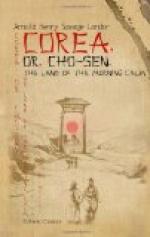Until quite lately, the coast villages and towns used to suffer much at the hands of Chinese pirates, who, though well aware that they would, if caught, most certainly find themselves in the awkward position of having their heads cut off, nevertheless used to approach the coast by night in swift junks, make daring raids, and pillage the villages, and even some of the smaller towns. So suddenly were these incursions usually made that by the time the natives had managed to get over their astonishment at the attack of these unpleasant and greedy visitors, the acute Chinamen, with their booty, were well out at sea again.
[Illustration: THE FIRE-SIGNAL STATION AND JOSS-HOUSE]
The great drawback to fire-signalling is, that messages can only be clearly conveyed at night. In the day-time, when necessary, smoke-signals are transmitted, though never with the same safety as are the fire-signals. By burning large torches of wet straw, masses of white smoke are produced, upon which the alarm is raised that the country is in danger. The code of smoke signalling, however, is almost limited to that one signal; for, on a windy or rainy day, it would be quite impossible to distinguish whether there were one or more torches smoking, unless, of course, they could be set very far apart, which cannot be done on Nanzam. Prior to sending a message, a bell is rung in the royal palace to attract the attention of the Mountain Watchmen. The whole code, for they have a really systematic way of using their pyrographs, is worked with five burning fires only, and more than that number of lights are never shown, though, of course, many times there are less. The five-lights-together signal, I believe, indicates that the country is in imminent danger; there are other signals to meet the cases of rebellions, recalling of magistrates from distant provinces, orders to them to extort money from their subjects, the despatch or recall of troops, &c. &c.




